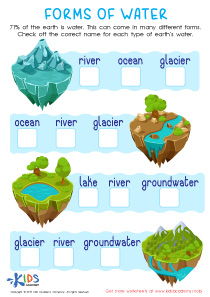Science Lessons | Organisms, Grade 3
4 results
Organisms Lessons for Third Grade is an exciting and educational course that introduces students to the wonders of the natural world. Through interactive worksheets, educational videos, and assessment quizzes, your child will learn all about the various organisms that make up our planet's diverse ecosystem. From birds to bugs, mammals to plants, this course covers it all, making it a fun and engaging way for your child to develop a lifelong appreciation for all living things. So, give your child the gift of knowledge with our Organisms Lessons, and watch them grow into curious and responsible stewards of the natural world.
Organisms Lessons for Grade 3 Children
The science of organisms is very interesting and valuable, particularly for our children in Grade 3. Understanding the different organisms on earth is essential as it lays the foundation for the knowledge of how the different animal, plant, and microorganisms interact with each other.
Our lessons on organisms are designed to be interactive, engaging, and educational to promote active participation of grade 3 children. Through interactive worksheets, videos, and assessment quizzes, children learn about the characteristics of organisms and the different types of organisms. They learn about how organisms grow, evolve and adapt to their environment. The lessons facilitate the children's understanding of the roles of organisms and their contributions to the environment, and develop their appreciation for the diversity of life.
One of the major benefits of our Organisms Lessons is that it helps the children to develop a scientific mindset. The lessons provide an opportunity for children to develop their curiosity, ask questions, explore, and by extension, do experiments and make discoveries. In addition, our lessons foster children's critical thinking skills, as they evaluate information about organisms, develop their own questions, and draw their inferences and conclusions.
The lessons are also comprehensive and enable the children to learn about different types of organisms. They learn about invertebrates such as insects and the features that make them different from vertebrates such as fish, reptiles, mammals, and birds. Also, the children learn about plants and their different classifications.
Another essential benefit of these lessons is the development of the children's vocabulary and language skills. Through interaction with the activities, children learn and acquire scientific terms, which help them expand their vocabulary and comprehend science concepts. They also engage in various activities, such as identifying and labeling, which enhances their writing, speaking, and reading skills.
Finally, one of the practical advantages of our lessons on organisms is that it makes learning fun, interactive, and engaging. The lessons are designed to be enjoyable and to incorporate a variety of interactive activities and educational videos that match the children's learning styles. Consequently, children look forward to learning more from the Organisms Lessons and are more likely to retain the learning material.
In conclusion, it is irrefutable that our lessons on organisms for grade 3 children are an invaluable tool for their studies. The lessons provide numerous benefits that extend beyond textbooks and notes. They stimulate curiosity, develop critical thinking skills, enhance vocabulary and language skills, and make learning fun, interactive, and engaging.















